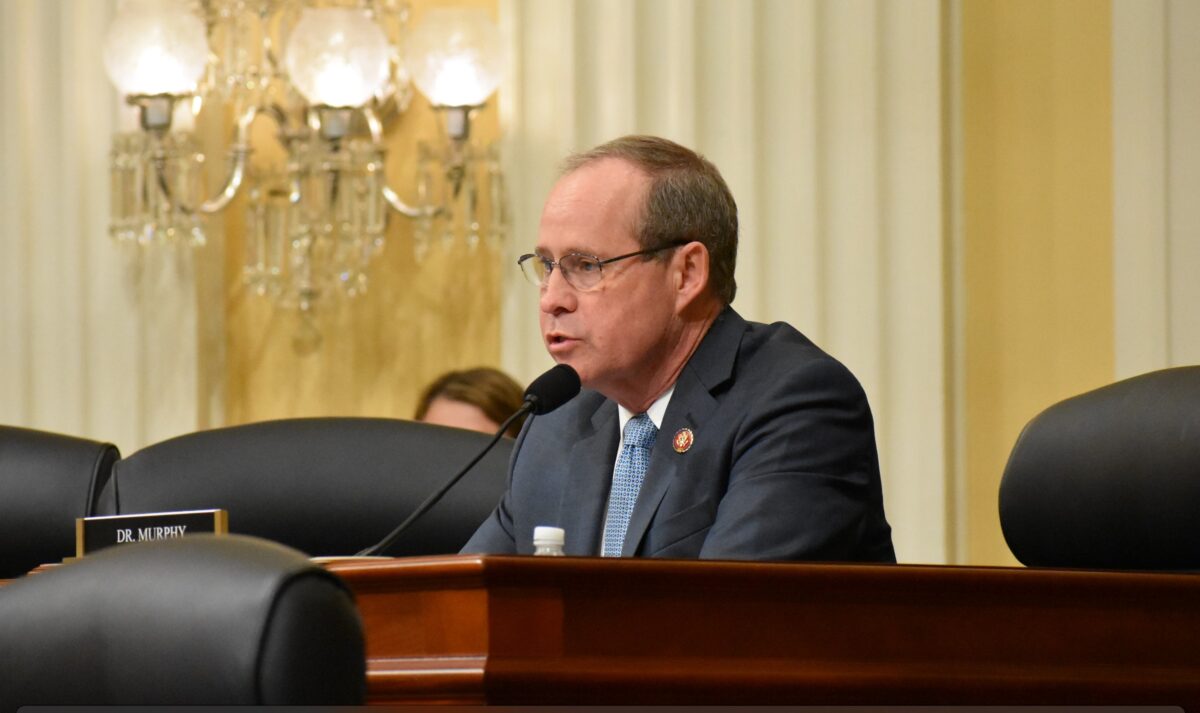


Starting in April, millions of Americans who are enrolled in Medicaid despite being ineligible will be removed from the program with the ending of the federal government’s COVID-19 national emergency.
The national emergency declaration, signed into to law by former President Donald Trump in March 2020, allowed the Department of Health and Human Services (HHS) to waive or modify some requirements for enrollment in Medicaid.
On March 29, the U.S. Senate voted 68–23 to terminate the emergency declaration. Of the 68 who voted in favor, 21 were Democrats.
Biden will reportedly not veto the bill, despite earlier opposition to the measure.
In a Jan. 30 Statement of Administration Policy (pdf), the Biden administration announced plans to extend the COVID-19 public health emergency to May 11. The reasoning was that an “abrupt end to the emergency declarations would create wide-ranging chaos and uncertainty throughout the health care system—for states, for hospitals and doctors’ offices and, most importantly, for tens of millions of Americans.”
The House voted 220–210 along part lines on Jan. 31 to end the public health emergency—a separate declaration from the national emergency—that was enacted three years earlier on Jan. 31, 2020.
Hayden Dublois, director of data and analytics at the Foundation for Government Accountability (FGA), said the federal government gave states additional Medicaid funding during the pandemic.
In exchange, the states had to agree to terms that prohibited them from removing anyone from their Medicaid rolls, even if they became ineligible for the program for the duration of the Public Health Emergency, Dublois told The Epoch Times.
“Remember, at the beginning of the pandemic we had those unemployment bonuses, the $600 weekly bonus, and that income was disregarded from being counted toward Medicaid eligibility,” Dublois recalled. “So you had people making well above the poverty level who were on Medicaid and continued to be on Medicaid long after they became ineligible because of these COVID-era restrictions.”
However, Dublois said states were not allowed to question an individual’s status or to allow their rolls to be scrutinized, restrictions he and others at the FGA described as “the Medicaid Handcuffs.”
“In December of 2022 Congress passed the Consolidated Appropriations Act, which said we can start removing these handcuffs and states can start removing people from their Medicaid rolls at the beginning of April, and that’s what we’re starting to see,” Dublois said.
“States are reasserting control over their Medicaid programs because this has cost them a tremendous amount of money. We’re talking hundreds of billions of dollars between the federally enhanced Medicaid funding and the fact that, for every person on the program that is ineligible, that costs state and federal taxpayers additional money. That takes away money from individuals who truly need Medicaid, such as the elderly and those with disabilities.”
Rather than decrying the removal of these individuals from the program, Dublois insists it’s a positive development.
“We should be celebrating the fact that states have regained control of their Medicaid programs and can remove these people who are no longer eligible. Now they can divert that money to the most vulnerable, those in extreme poverty, and those who have an intellectual, developmental, or physical disability. Those are the people in need. Those are the people the Medicaid program was created for. That’s where we need to be getting this back to.”
Asked where the abuse of the Medicaid program started, through “Obamacare” or the COVID public emergency, Dublois was direct.
“Medicaid fraud, waste, and abuse have been around for a long time,” he explained, saying “Obamacare essentially hit the accelerator.”
Dublois further noted that the Centers for Medicare and Medicaid Service (CMS) releases a yearly analysis of improper Medicaid payments.
“Right now, it’s roughly 1 out of every 5 dollars going to Medicaid is improperly spent,” he said. “That’s through blatant fraud, administrative errors, providers over-billing.”
For example, CMS confirmed that improper Medicaid payments amount to more than $80 billion annually—more than five times higher than they were just before Medicaid expansion began.
In an audit conducted over the period of October 2014 to March 2015, the HHS Office of the Inspector General found that New York made an estimated $26.2 million worth of improper payments to 47,271 ineligible individuals who signed up for Medicaid via former President Barack Obama’s Medicaid expansion (pdf).
During the same audit period, Kentucky made an estimated $105 million worth of improper payments to 34,593 potentially ineligible individuals (pdf), Ohio made an estimated $823.9 million worth of improper payments (federal share only) to 293,998 ineligible or potentially ineligible individuals (pdf), and California made a staggering $1.15 billion worth of improper payments to 455,133 ineligible or potentially ineligible individuals (pdf).
In an audit period of January 2014 to September 2015, Colorado made an estimated $93.3 million worth of improper payments to 98,457 ineligible or potentially ineligible individuals (pdf).
“None of these include the post-COVID Medicaid ineligible issues,” Dublois noted. “This is all on top of that.”
In all, Deblois estimates that between $20 million and $25 million has been paid to unqualified individuals through Medicaid since the beginning of the COVID-19 national emergency.
“It’s an astonishing amount when you consider that there are around 100 million people on the program,” he said. “So we’re talking about somewhere between a fifth and a quarter of the entire Medicaid programs consists of people who aren’t eligible. Think about that.”
Moreover, Dublois believes this was intentional.
“We term it as ‘fraud by design,'” he said. “When you look at state Medicaid programs, many states will accept self-attestation of an individual’s income. They take people’s word for their reported income and will not conduct any pre- or post-enrollment verification. There are components of Medicaid that have been woefully inadequate and that inadequacy in terms of no safeguards or cross-checks was by design. You have a provision snuck into a coronavirus relief bill that eviscerated a state’s control over Medicaid, and for years we have had to deal with the consequences. That’s ‘fraud by design.'”
Asked who would be the ultimate beneficiary of the ‘fraud by design’ program, Dublois was again resolute.
“It was a massive, back-door expansion of welfare designed to attract dependent voters,” he said.
“It’s a play for votes,” Dublois asserted, calling it a “strategic calculation to get people on the program who will in turn give them votes in the next election cycle.”
“There is a political interest in ensnaring millions of Americans in the trap of welfare dependency,” he added. “There’s no doubt in my mind that calculation went into this.”
Rep. Greg Murphy (R-N.C.) says enrollment in Medicaid is all about qualifications.
“There are certain requirements to be on Medicaid and if you meet those requirements you should, by all means, receive those benefits,” Murphy told The Epoch Times. “However, during the public health emergency, 18 million people wound up on the Medicaid rolls that simply do not qualify. When this is over, most of them are going to have to get a job, go back to work, and pay for health care through Medicare rather than just receiving free benefits from the government.”
As Murphy explained, the mantra of the Biden administration “has been very anti-work.”
“They want to create an environment of government dependency, and I am thankful that this legislation will, in some small part, will end some of that,” he said.
While the public health emergency was started at the beginning of the pandemic by the Trump administration, “and appropriately so,” Murphy said, “the continuation of the public health emergency was political on many different fronts.”
“Again, part of their mantra is to create government dependency and, subsequently, the vote-buying that goes with that,” Murphy said. “I’m glad Biden will be forced to sign this legislation because of bipartisan support. I think it’s way past time for the public health emergency to be over. But it has been kept alive by the Biden administration merely for political benefit. Now that there’s bipartisan support and bicameral support to end it, it will get a lot of Americans back to work and back to good-paying jobs with benefits. They’re going to have to go back to work.”
For those who refuse to go back to work, Murphy said “they’re going to have to figure out a way to feed themselves and pay their rent and utilities.”
“We have more than 10 million job openings in this country right now,” Murphy noted.” The unemployment rate is very low. But the workforce participation rate is one percent lower. That means close to two-and-a-half million individuals are not working who should be working. This removal of the gravy train will force some individuals to get back to work and be active participants in American society.”


